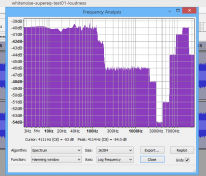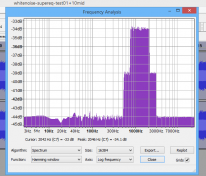SuperEQ
Raffriff42 (Talk | contribs) (clarify frequency bands & etc; add links) |
Raffriff42 (Talk | contribs) m (touch-up) |
||
| Line 62: | Line 62: | ||
SuperEQ can accept a [http://www.foobar2000.org foobar2k] equalizer '''Preset''' (.feq) file. Foobar's equalizer can be found in the [http://wiki.hydrogenaud.io/index.php?title=Foobar2000:Preferences:Playback:DSP_Manager DSPManager], and presets are adjusted and saved from there as well. | SuperEQ can accept a [http://www.foobar2000.org foobar2k] equalizer '''Preset''' (.feq) file. Foobar's equalizer can be found in the [http://wiki.hydrogenaud.io/index.php?title=Foobar2000:Preferences:Playback:DSP_Manager DSPManager], and presets are adjusted and saved from there as well. | ||
| − | An .feq file is a text file with a positive or negative integer on each line. No extra characters are allowed on the line. | + | An .feq file ([[Loudness.feq|sample]]) is a text file with a positive or negative integer on each line. No extra characters are allowed on the line. |
| − | Each value controls the amplification in decibels over one frequency band. | + | Each value controls the amplification in [[wikipedia:Decibel|decibels]] over one frequency band. Preset files can be found in your \AviSynth25\Examples folder (Equalizer Presets.zip), or may be found by searching the Web for "foobar2000 presets." |
| − | + | '''Example 1:''' ''Apply [[Loudness.feq|"Loudness.feq"]] Preset file'' | |
| − | + | ||
| − | '''Example 1:''' ''Apply [[Loudness.feq|"Loudness.feq"]] | + | |
SuperEq("C:\Equalizer Presets\Loudness.feq") | SuperEq("C:\Equalizer Presets\Loudness.feq") | ||
| Line 76: | Line 74: | ||
| − | From Avisynth version 2.60, '''band gain arguments''' allow all 18 bands to be set within your script, instead of requiring a preset file. The values are specified in | + | From Avisynth version 2.60, '''band gain arguments''' allow all 18 bands to be set within your script, instead of requiring a preset file. The values are specified in decibels, as integer or floating point. |
'''Example 2:''' ''Boost midrange (speech) using band arguments'' | '''Example 2:''' ''Boost midrange (speech) using band arguments'' | ||
Revision as of 00:37, 1 September 2015
SuperEQ(clip, string filename)
SuperEQ(clip, float band1 [, float band2, ..., float band18])
Parameter:
| filename | The foobar2k equalizer preset file to apply. |
| band1-band18 | Allows to set all bands within your script (in dB). |
Shibatch Super Equalizer is a graphic equalizer, originally created as plugin for Winamp. It was originally written by Naoki Shibata. SuperEQ uses 16383th order FIR filter with FFT algorithm. Its equalization is very precise.
Note that unlike traditional equalizers, there is very little roll-off or overlap between the bands; see the spectrum analysis images below.
The 18 SuperEQ bands cover the following frequency ranges:
| Band # | f (low) | f (high) |
|---|---|---|
| 1 | 0 Hz | 65 Hz |
| 2 | 65 Hz | 92 Hz |
| 3 | 92 Hz | 131 Hz |
| 4 | 131 Hz | 185 Hz |
| 5 | 185 Hz | 262 Hz |
| 6 | 262 Hz | 370 Hz |
| 7 | 370 Hz | 523 Hz |
| 8 | 523 Hz | 740 Hz |
| 9 | 740 Hz | 1046 Hz |
| 10 | 1046 Hz | 1480 Hz |
| 11 | 1480 Hz | 2093 Hz |
| 12 | 2093 Hz | 2960 Hz |
| 13 | 2960 Hz | 4186 Hz |
| 14 | 4186 Hz | 5920 Hz |
| 15 | 5920 Hz | 8372 Hz |
| 16 | 8372 Hz | 11839 Hz |
| 17 | 11839 Hz | 16744 Hz |
(adapted from avisynth/src/audio/supereq.h)
SuperEQ can accept a foobar2k equalizer Preset (.feq) file. Foobar's equalizer can be found in the DSPManager, and presets are adjusted and saved from there as well.
An .feq file (sample) is a text file with a positive or negative integer on each line. No extra characters are allowed on the line. Each value controls the amplification in decibels over one frequency band. Preset files can be found in your \AviSynth25\Examples folder (Equalizer Presets.zip), or may be found by searching the Web for "foobar2000 presets."
Example 1: Apply "Loudness.feq" Preset file
SuperEq("C:\Equalizer Presets\Loudness.feq")
Audacity spectrum analysis
From Avisynth version 2.60, band gain arguments allow all 18 bands to be set within your script, instead of requiring a preset file. The values are specified in decibels, as integer or floating point.
Example 2: Boost midrange (speech) using band arguments
ConvertAudioToFloat SuperEQ( \ 0, [* 65 *] \ 0, [* 92 *] \ 0, [* 131 *] \ 0, [* 185 *] \ 0, [* 262 *] \ 0, [* 370 *] \ 0, [* 523 *] \ 5, [* 740 *] \ 10, [* 1046 *] \ 10, [* 1480 *] \ 10, [* 2093 *] \ 5, [* 2960 *] \ 0, [* 4186 *] \ 0, [* 5920 *] \ 0, [* 8372 *] \ 0, [* 11839 *] \ 0 [* 16744 *] \ ) ConvertAudioTo16bit
Audacity spectrum analysis
Requirements:
This plugin is optimized for processors which have cache equal to or greater than 128k bytes (16383*2*sizeof(float) = 128k). This plugin won't work efficiently with K6 series processors.
Changes:
| v2.60 | Added custom band setting to allow all 16 bands to be set from script. |
| v2.54 | Initial Release. |
Some parts of SuperEQ are:
Copyright © Naoki Shibata.
Other parts are:
Copyright © 2001-2003, Peter Pawlowski
All rights reserved.

